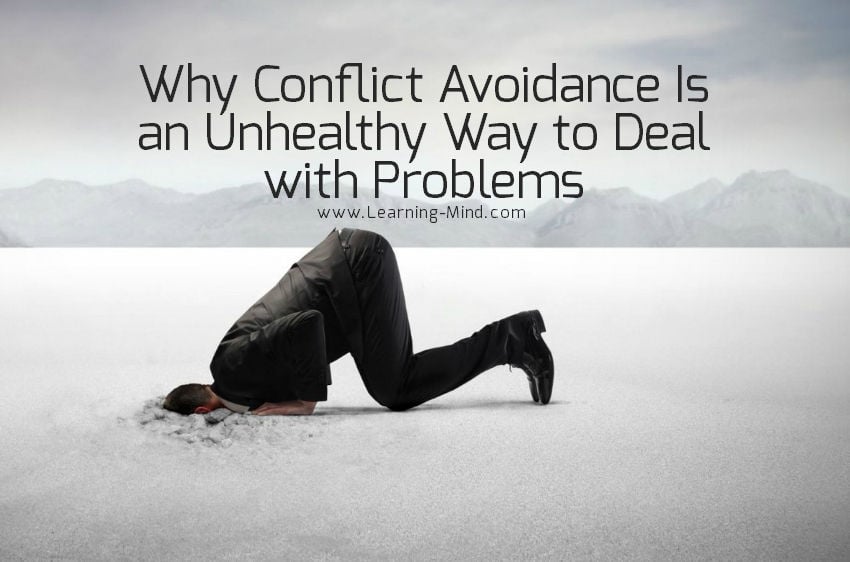
Conflict avoidance can manifest in many situations, whether it be personal relationships or in the workplace. People tend to use it in order to suppress an unpleasant encounter.
There are many ways of doing this, including ignoring the conflict, changing the subject, shutting down or even pretending it isn’t happening.
Probably the most common methods of avoiding conflict is to simply ignore the problem. This way, you don’t have to deal with any of the outcomes. For example, a husband who suspects his wife is cheating on him might choose to ignore it, as if it came to light there’s a danger his wife might leave him.
Diverting attention away from the conflict is another method of conflict avoidance. It usually happens when one person does not want to face the conflict and chooses to focus on another problem instead.
You know those people that seem to shut down when you try to engage with them? It’s even more irritating when the conflict needs to be resolved in a speedy fashion. The problem with shutting down is that it can make the situations worse.
There are some situations where it is best to use conflict avoidance. But at the end of the day, it is usually better to try and overcome it and deal with the conflict at hand.
If we constantly avoid conflict, then we are essentially suppressing our emotions. There have been lots of research to suggest that this is not healthy.
By pushing down our feelings of constantly avoiding conflict, it is more than likely that they will surface elsewhere as anxiety or anger and when you least expect it. Tensions can rise and bubble over in other areas of your life when it is not appropriate for them to come out. And if you keep avoiding conflict, this is going to happen more regularly than not.
Constantly avoiding conflict teaches the brain, in a negative way, that this is what is keeping us safe from unpleasant feelings. The problem is that by avoiding the conflict, we are only putting off what we need to do.
By avoiding it, the feelings of relief we get are negatively reinforcing our avoidance. But although this feels good at the time, because we don’t have to deal with the problem, in the long run, it increases our fears as we’re not dealing with it.
The best way to deal with conflict is to face it and face the problem. Then we are not storing up fearful emotions and trauma for the future.
Avoiding conflict means we are usually missing opportunities, not just for personal growth but in life too. If we become fearful of dealing with issues, we are stunting our personal growth.
Dealing with conflict is a chance for change and growth and stops us stagnating. We can also miss opportunities as our fears of conflict can become irrational and cause phobias. This can be restrictive in our everyday lives and stop us from living a fulfilling life.
There are situations in which the avoidance conflict style can work well. For instance, if you don’t have the time to devote to the problem, by calming the situation down or by allowing yourself time to properly deal with the matter.
However, conflict, as a rule, should not be avoided or ignored. It is a chance to resolve disagreements and come to some sort of resolution. Leaving conflicts unresolved can lead to frustration and pent-up emotions. It also means that you are essentially trapped in that situation and cannot move on.
The key is to know when to avoid conflict and when to confront it. Understanding why you avoid conflict is also important as it can give you valuable insights into your own character. Do you lack self-confidence or have low self-esteem? Are you worried about the emotions it will release or are you afraid of hurting other people’s feelings?
Dealing with conflict on a regular basis will only make you more confident and able to deal with future issues.
References:
View Comments
You need to be very careful when advising confrontation to deal with a a conflict. Confrontation does NOT work when you are dealing with someone who is under the influence of drugs and\or alcohol. Confrontation in these situations have and will again cost innocent people their lives. Think and investigate thoroughly.
I did not advise confrontation to deal with a conflict, I did say that it was important to know when to avoid conflict and when to deal with it.
@Sheila -
You're way off base and didn't read the article. Conflict avoidance is a big problem. Not every situation calls for direct and forceful conflict resolution but a chronic lifestyle of conflict avoidance is unhealthy.
This was a great article. I searched for "conflict avoidance" in relation to someone else so that I could understand it better. After reading it I realized I'm guilty of many of the same things! Funny how sometimes such simple truths need to be spelled out in front of us to appreciate them. Thanks for a thought provoking read!
Hi
My partner due to his violent childhood suffered from the fear of addressing any conflict in our 11-year happy relationship. This resulted in him splitting off any difficult emotions. He also had a massive fear of abandonment. His fears were all unfounded. This ruined our relationship. If you fear to address what you perceive as conflict within your relationships then get help... Things you are thinking are probably completely unsubstantiated. If you have never discussed your concerns how will you ever know? Read about conflict avoidance and get therapy if you can.. (